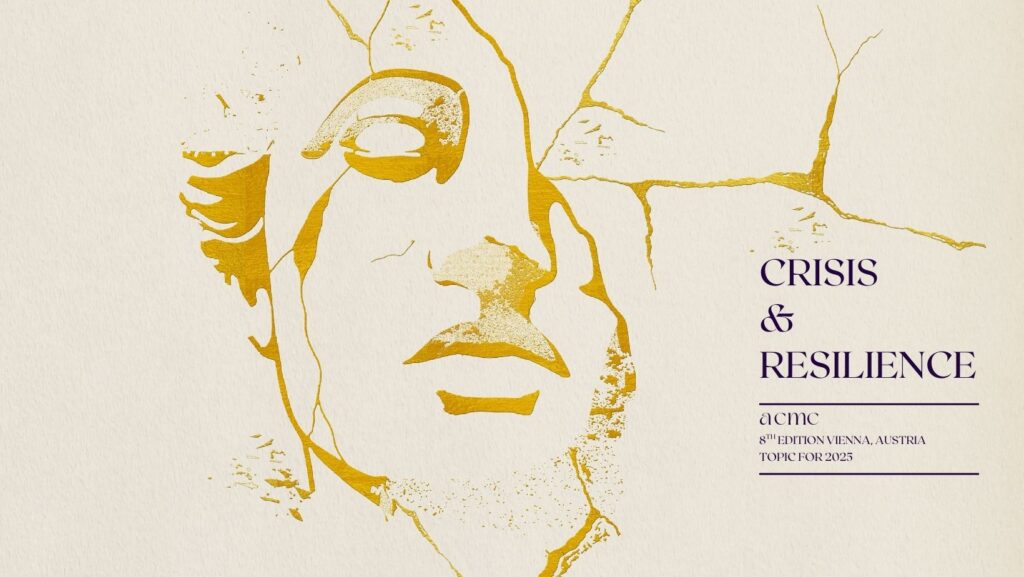Crisis & Resilience – Cultural survival, independence, and adaptation in times of disruption
The 8th edition of the Arts & Cultural Management Conference just arrived, and we can’t wait to share all the exciting details with you!

Throughout history, the arts have been vital to cultural survival, identity, and adaptation—especially in times of crisis. From war and colonization to economic collapse and pandemics, artists have preserved traditions, asserted autonomy, and innovated in response to adversity. Today, in a world shaped by systemic crises, art faces a defining question: What is its role, and how can it adapt to imagine new futures?
Deconstructing the topic: Defining Crisis
The word “crisis” comes from the Greek krisis, meaning “decision” or “turning point”—not inherently negative, but signaling abrupt change. The global cultural landscape now faces multiple pressures: economic instability, political repression, climate change, war, and pandemics. These forces, along with growing censorship of artistic expression and reduced funding, threaten artistic freedom and sustainability. The commercialization of art forms, the capitalization of the art market , the emphasis on competitiveness and, at the same time, the devaluation of the artistic labor, are threatening creative independence and questioning the role of the arts. Digital platforms offer new opportunities but also pose challenges like algorithmic control over visibility. Given this “critical” landscape, it is interesting to enquire what is/could/should be the role of the cultural sector in such transformative times and if there are ways in which it could contribute to shaping holistic and humanistic responses to said crises.
Resilience Through Art
Despite the challenges and new conditions that can be essentially restrictive if not threatening, art has always found ways to gatekeep cultural survival and independence through resilience. Independence in art is about asserting autonomy and challenging dominant narratives. In many cases, art becomes a form of defiance against external forces that seek to dominate cultural narratives. Artistic autonomy lies not only in freedom of expression, but in defy capitalistic principles and are brought forward even without the appropriate economic return. This is also one of the reasons why artistic livelihoods are considered “precariat”.
Resilience is embedded with adaptability, the power to overcome crises and re-invent artistic phenomena in new conditions. In that sense, resilience, as well as sustainability in arts and culture, although tokenized in the contemporary capitalistic market, serves as a dismantling force that challenges these exact systems. Adaptation is equally essential for artistic resilience, allowing traditions to evolve while retaining their essence and guarantee sustainability. Resisting to challenges and re-imagining new paths to exist is the central core of resilience that transcends art, making it a relevant force for change.
Call to action
The 8th edition of the Arts and Cultural Management Conference (ACMC) is scheduled for 30-31 October and 1st of November at the Amerlinghaus Cultural Centre in Vienna, and it is themed Crisis & Resilience. We are officially inviting MA students and PhDs to submit contributions that wrestle with what this means in real, messy, lived terms. We’re not only interested in theoretical speculations and solutions, but we also want to hear from those sitting in the tension, those asking uncomfortable questions, those addressing real case studies.
In this year’s conference we invite contributions in the following areas:
- Is there a holistic definition of culture? Assessing the quality of culture.
- Artistic freedom in oppressive or commercialised contexts
- Culture and democracy – Is/can culture be democratic? Artistic expression as political act: Should cultural expression be a form of political intervention in its own right? Can artistic and cultural endeavours to be A-political?
- Cultural heritage: ephemeral art forms & preservation
- Viable, alternative models of cultural funding and sustainability
- The dynamics of visibility, control, and agency in digital platforms
- The ethics and politics of cultural survival in the face of the ongoing crisis
- Cultural institutions/ initiatives serve as mediators between communities and power structures: opportunities and challenges
- Resilience: between greenwashing and community building?/ Does the resilience discourse become a performative tool to establish an agenda
The selected authors will be invited to present their work at the conference which will be published in the peer reviewed online academic journal Nexis Key, a Journal of Research and Scholarship.
Please submit the full paper at acmccoordinator@gmail.com address with Submission Crisis and Resilience 2025 and your name in the subject line. For more information visit here.
Submissions are accepted until 31 August 2025 and the ACMC will notify the selected authors by the 15th of September at the latest. Early submission is encouraged as the papers will be screened on a rolling basis.
